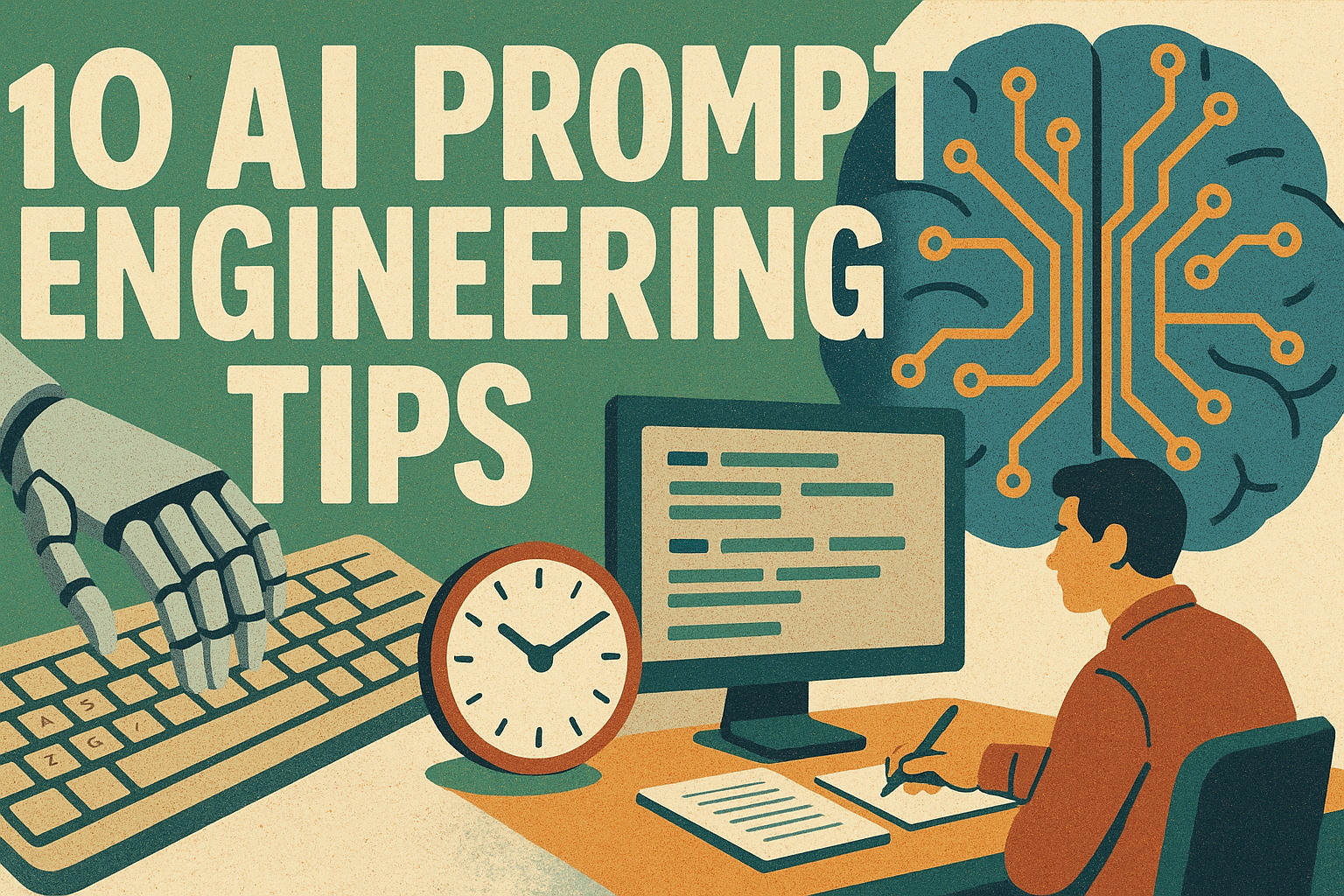The difference between an AI that saves you 3 hours a day and one that wastes your time often comes down to a single thing: your prompt.
A vague prompt (“Write an email”) gets vague results. A precise prompt (“Write a polite, 120-word follow-up email to a prospect who hasn’t responded in 5 days, referencing our previous call about marketing automation, and end with a direct question”) gets you something you can use right away.
That’s prompt engineering in action — and you don’t have to be a coder to do it. You just need to know how to frame your requests so AI understands exactly what you want.
Here’s how to do it, with 10 engineered prompts that will save you hours each day..
1. Meeting Notes → Action Plan

Engineered Prompt: "Summarize this meeting transcript into 3 sections: decisions, action items (with responsible person), and deadlines. Use bullet points, no more than 12 words each, and bold any unresolved questions."
Engineering Principle: Add structure (3 sections), format (bullets, bold), and constraints (word count) to reduce editing time.
Time saved: 20–30 minutes per meeting.
2. Email Drafting → Ready-to-Send
Engineered Prompt: "Write a friendly, professional reply to this email [paste email]. Keep it under 150 words, start with gratitude, reference their concern about [topic], and end with a clear next step."
Engineering Principle: Give AI tone, structure, and context from the original email so the draft is usable as-is.
Time saved: 5–10 minutes per email.
3. Research Summaries → Decision-Ready Briefs
Engineered Prompt: "Summarize this article [paste text/link] in under 200 words. Include: 3 key stats, 2 main takeaways, and 1 quote suitable for a slide deck."
Engineering Principle: Specify output length and categories so you get a brief you can drop into a presentation without rework.
Time saved: 30–40 minutes per research task.
4. Idea Generation → Sorted by Impact
Engineered Prompt: "Generate 10 content ideas for [product/service] targeting [audience]. Rank them from highest to lowest potential impact based on [goal]. For each idea, include a headline and 1-line description."
Engineering Principle: Ask AI to prioritize results so you can act on the best ideas first.
Time saved: 30–45 minutes on brainstorming.
5. Report Formatting → Executive Summary First
Engineered Prompt: "Reformat this raw report [paste text] into: (1) a 50-word executive summary, (2) 3–5 key findings in bullet points, and (3) recommendations in plain English."
Engineering Principle: Front-load the summary, then organize findings for instant comprehension.
Time saved: 25–30 minutes per report.
6. Task List → Strategic Schedule
Engineered Prompt: "Here’s my task list [paste list]. Categorize by urgency and importance using the Eisenhower Matrix, suggest realistic deadlines, and identify tasks that can be delegated."
Engineering Principle: Embed a proven productivity framework directly into your prompt.
Time saved: 15–20 minutes daily.
7. Presentation Prep → Slide-by-Slide Script
Engineered Prompt: "Create a 6-slide presentation outline for [topic]. For each slide: title, 3 bullet points (max 12 words each), and a suggestion for a supporting visual."
Engineering Principle: Force consistent structure slide-by-slide to avoid reformatting later.
Time saved: 45–60 minutes per deck.
8. Policy Translation → Plain English Digest
Engineered Prompt: "Rewrite this policy [paste text] at an 8th-grade reading level. Keep under 200 words, use bullet points for rules, and bold any penalties or deadlines."
Engineering Principle: Set readability level and formatting to match your audience’s needs.
Time saved: 20 minutes per document.
9. Social Media Batch → Varied Styles
Engineered Prompt: "Write 5 LinkedIn posts promoting [topic]. Vary tone: 1 professional, 1 playful, 1 data-driven, 1 inspirational, 1 storytelling. Each under 100 words with a call-to-action."
Engineering Principle: Specify tone variety upfront to create diverse, ready-to-schedule content.
Time saved: 1–2 hours/week.
10. FAQ Builder → Multi-Level Audience
Engineered Prompt: "Based on this product info [paste details], create 5 beginner-level FAQs and 5 advanced FAQs. Keep answers under 50 words and use plain English."
Engineering Principle: Define audience segments so AI can tailor complexity in the output.
Time saved: 30 minutes per FAQ set.
Prompt Engineering Tips That Apply to All Tasks
- Give context: Paste relevant info directly into your prompt.
- Define output structure: Lists, tables, sections — it matters.
- Set constraints: Word count, tone, readability level.
- Ask for prioritization: Saves you from scanning irrelevant results.
- Iterate: Treat prompts like drafts — tweak until they give you exactly what you need.
Bottom line: Better prompts mean better outputs. Better outputs mean less editing. Less editing means more time saved — sometimes hours per day. Start with these engineered prompts, refine them for your own workflow, and you’ll see AI go from “interesting” to indispensable.



